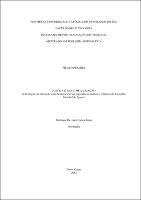| Share record |


|
Please use this identifier to cite or link to this item:
https://tede2.pucrs.br/tede2/handle/tede/5850Full metadata record
| DC Field | Value | Language |
|---|---|---|
| dc.creator | Pereira, Pilato | - |
| dc.creator.Lattes | http://buscatextual.cnpq.br/buscatextual/visualizacv.do?id=K4421140P0 | por |
| dc.contributor.advisor1 | Susin, Luiz Carlos | - |
| dc.contributor.advisor1Lattes | http://buscatextual.cnpq.br/buscatextual/visualizacv.do?id=K4707532D4 | por |
| dc.date.accessioned | 2015-04-15T12:50:21Z | - |
| dc.date.available | 2012-04-13 | - |
| dc.date.issued | 2012-03-28 | - |
| dc.identifier.uri | http://tede2.pucrs.br/tede2/handle/tede/5850 | - |
| dc.description.resumo | Desde o advento da globalização de um mundo em mudança de época, persentimos um clima de injustiças, onde a vida criada por Deus é vilipendiada em nome do lucro. Num tempo marcado pelo descuido e ameaças de escassez e privatização dos recursos naturais, a humanidade e a Terra sentem o drama das mudanças climáticas. Já vem sendo, portanto, hora de se perguntar pela fé no Deus Criador. O que as igrejas cristãs dizem e fazem e/ou o que mais elas poderiam e deveriam dizer e fazer frente aos problemas ambientais? Pois, foi com esta preocupação que nos empenhamos em pesquisar a ecoteologia do Conselho Mundial de Igrejas (CMI). Esta pesquisa tem como argumento a experiência prática e reflexiva do CMI sobre ecologia em interação com justiça e paz, a partir da convocatória ecumênica mundial de Seul, em 1990. E, também procuramos fazer contraponto com a ecoteologia de Leonardo Boff e a experiência da Pastoral da Ecologia CNBB Sul 3. E na lógica do método Ver-Julgar-Agir, esta dissertação procura demonstrar a trasnversalidade da ecologia do movimento ecumenico mundial ligado ao CMI. A pesquisa está focada nos documentos do programa Justiça, Diaconia e Responsabilidade com a Criação , mais especificamente o projeto Ecojustiça , da Comissão de Assuntos Internacionais do CMI. Ecojustiça é a consonância de uma longa tradição do Conselho Mundial de Igrejas em abordar as relações transversais entre Justiça, Paz e Integridade da Criação (JPIC). O CMI faz uma releitura da Bíblia e, num olhar ecológico, com uma atenciosa escuta da profecia da Terra e dos pobres, vem chamando as igrejas a reassumirem sua alinaça de justiça, amor e paz com Deus criador e defensor da Vida. | por |
| dc.description.abstract | Since the globalization advent of a world of time change, we envision a climate of injustice, in which the life created by God is despised in favor of profit. In a time marked by carelessness and threat of scarcity and privatization of the natural resources, humanity and Earth feel the drama of climate changes. Therefore, it has been time of wondering about faith in God the Creator. What do the Christian Churches state and do and/or what could/should they say and do in face of environmental issues? Then, with that concern, we devoted to research the ecotheology of the World Council of Churches (WCC). This research has as argument the practical and reflexive experience of WCC about the interaction of ecology with justice and peace since the world ecumenical call of Seul in 1990. We also seek to do a counterpoint with the ecotheology by Leonardo Boff and the experience of the Ecology Pastoral of CNBB Sul 3. Moreover, following the logic of the see-judge-act method, this dissertation intends to demonstrate the transversality of ecology of the world ecumenical movement connected to WCC. This study is focused on the document of the Justice, Diakonia and Responsibility with Creation program, more specifically the Eco-Justice project of the Commission of the Churches on International Affairs of WCC. Eco-Justice is the consonance of a long tradition of WCC in approaching the transversal relations among Justice, Peace and Integrity of Creation. WCC makes a Bible rereading and, under an ecological light, with an attentive perceiving of both Earth and poverty prophecy, has been calling churches to reassume their alliance of justice, love and peace with God the Creator and the Defender of Life. | eng |
| dc.description.provenance | Made available in DSpace on 2015-04-15T12:50:21Z (GMT). No. of bitstreams: 1 437809.pdf: 969124 bytes, checksum: e141d8ddf1a876f281e6ee1e76d5061e (MD5) Previous issue date: 2012-03-28 | eng |
| dc.format | application/pdf | por |
| dc.thumbnail.url | http://tede2.pucrs.br:80/tede2/retrieve/17092/437809.pdf.jpg | * |
| dc.language | por | por |
| dc.publisher | Pontifícia Universidade Católica do Rio Grande do Sul | por |
| dc.publisher.department | Faculdade de Teologia | por |
| dc.publisher.country | BR | por |
| dc.publisher.initials | PUCRS | por |
| dc.publisher.program | Programa de Pós-Graduação em Teologia | por |
| dc.rights | Acesso Aberto | por |
| dc.subject | RELIGIÃO | por |
| dc.subject | ECOLOGIA - ASPECTOS RELIGIOSOS | por |
| dc.subject | ECUMENISMO | por |
| dc.subject | MEIO AMBIENTE - MUDANÇAS CLIMÁTICAS | por |
| dc.subject.cnpq | CNPQ::CIENCIAS HUMANAS::TEOLOGIA | por |
| dc.title | Justiça e paz com a criação : a ecologia em interação com justiça e paz na experiência prática e reflexiva do Conselho Mundial de Igrejas | por |
| dc.type | Dissertação | por |
| Appears in Collections: | Programa de Pós-Graduação em Teologia | |
Files in This Item:
| File | Description | Size | Format | |
|---|---|---|---|---|
| 437809.pdf | Texto Completo | 946.41 kB | Adobe PDF |  Download/Open Preview |
Items in DSpace are protected by copyright, with all rights reserved, unless otherwise indicated.




